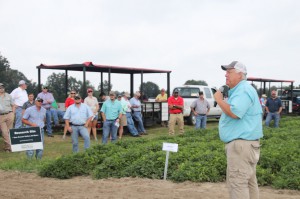 Bob Kemerait, Extension specialist at the University of Georgia, focuses his research efforts on peanuts, as well as cotton, soybean and corn nematode diseases as well. “One of the most important things I work with is the peanut crop and fortunately for plant pathologist, but unfortunately for peanut growers in the Southeast, we have any number of disease and nematode problems,” Kemerait says.
Bob Kemerait, Extension specialist at the University of Georgia, focuses his research efforts on peanuts, as well as cotton, soybean and corn nematode diseases as well. “One of the most important things I work with is the peanut crop and fortunately for plant pathologist, but unfortunately for peanut growers in the Southeast, we have any number of disease and nematode problems,” Kemerait says.
In Kemerait’s Extension role, he cooperates with Tim Brenneman and Albert Culbreth, who coordinate the research projects. Kemerait works with them to get the results and information from the research to extension agents and farmers. Kemerait credits the Georgia Peanut Commission for sponsoring the research projects.
Some of the research focuses on the use of resistant varieties to minimize disease impact, use of fungicides and new improved fungicides, new modes of action coming out in fungicides and looking at ways we can fight nematodes. Kemerait does assist in the research, but his main job is to extend this information through our county agents to the growers so they can make better timely management decisions and hopefully stay profitable into the future.
Kemerait is excited to have the Georgia Peanut Tour visit the University of Georgia Southwest Georgia research and education center in Plains. Kemerait realizes that a lot of people around the country think of President Jimmy Carter when they think of peanuts and Plains, but he encourages individuals to also think about the agriculture research that happens in Plains.
Through Kemerait’s program, he coordinates research with graduate students at the University of Georgia. Recently he has been working to study the impact of production practices on tomato spotted wilt virus. As recently as ten years ago, tomato spotted wilt virus could have been a threat to our industry and we’re seeing a resurgence now. One of the ways farmers fight tomato spotted wilt virus is to look at all the production factors, the planning date, the variety, the seeding rate, the use of in-furrow insecticides.
